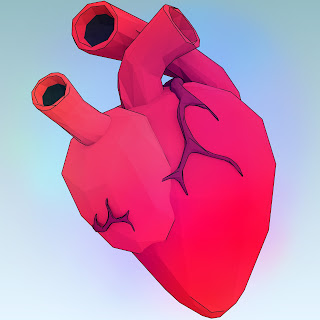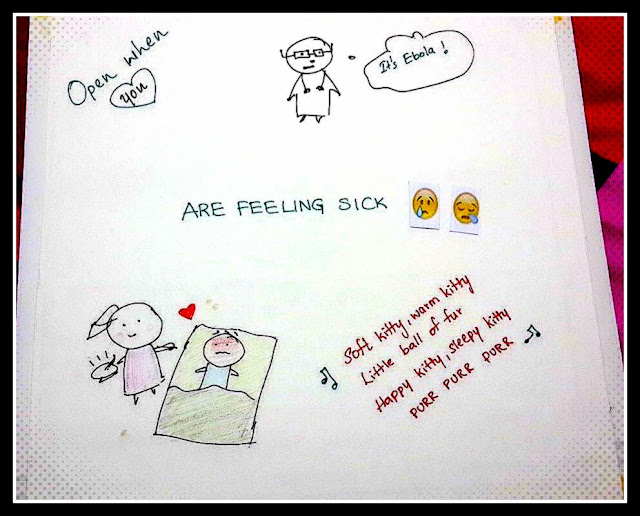Heart - Stents and Complications
Disclaimer: I am not in the field of medicine, this is just based on my experience with family health issues and my learning.
Not all body disorders are obvious to us and heart issues are one of them. The best thing to do would be to get regular health checkups annually, instead of thinking of them as a hassle or a low priority item that can be postponed.
Heart issues can be concealed even more if you are diabetic. Women are even more asymptomatic and diabetes can lead to silent heart attacks.
 |
| Heart - Stents and Complications |
Symptoms:
Few signs,you can watch out for, that can be misinterpreted as low glucose levels or low hemoglobin are -
- Extreme fatigue or weakness
- Dizziness
- Breathlessness or shortness of breath
- Uneasiness in chest/slight pain like heartburn and sometimes an upset stomach.
Apart from these, if someone is having a heart attack, they can have the following symptoms:
- Unexplained anxiety or a sense of impending doom - Trust the patient or at least give them a benefit of doubt, even if doctors/nurses say otherwise. They may be experiencing this before actually feeling the crushing pain of a heart attack. Are they worried? Are they talking about fatal incidents or settling any unfinished affairs?
- Nausea/vomiting/upset stomach.
- Cold sweats/shivers.
- Pain - apart from the chest pain(left/center), pain can be experienced anywhere in shoulder/arm, neck, jaw and back.
Heart:
Our heart needs blood and oxygen for itself before supplying it to any other body parts. This is achieved through coronary arteries. But sometimes, because of cholesterol/plaque build up in arteries, they can get clogged up and fail to supply enough blood and thereby oxygen to heart. When plaque ruptures, clots can block up the remaining artery, completely cutting off the oxygen to heart - when this happens, we get a heart attack.
Some arteries/part of arteries supply blood to a large area of heart and these are important(dominant). The main artery of heart, called aorta, divides into left(LCA - important) and right(RCA). LCA further divides into LAD(important), Ramus, LCX etc.
Diagnostic tests:
In a general checkup/consultation, the generally prescribed tests are ECG, 2D echo and TMT. If anything comes up in these tests, then one would be advised to get angiogram to find out if there are any blocked arteries in heart. In an angiogram, a catheter(inserted from hand/leg to heart) and dye are used to find any artery blockages. Depending on the percentage of blockage in arteries, one would be advised either medicines or stents or bypass surgery. This also depends on the number of blocks and other co-morbidities one may be having. Generally, stent is advised for a blockage > 70%. Stent is a pipe kind of device that will keep the blocked artery open.
Stents:
The blocked arteries will be expanded through balloons, compressing the plaque - this procedure is called angioplasty. In addition to this, a stent may be used to keep the artery open. Angiogram and angioplasty are less invasive and less complicated procedures, compared to bypass(CABG) - which is open heart surgery.
As with any medical procedure, stents have their own complications - which can be rare, but still a possibility(not to scare, but you should know , before getting a stent). Stents can themselves get blocked because of two reasons - clots inside stent(acute and serious) called thrombosis or cells growing inside stent over a period of time called restenosis. Stent is ultimately a foreign object inside our heart and our body may not accept it in some cases, generating clots(during stent placement itself). This is why after angioplasty, patient is kept on dual antiplatelet therapy - aspirin(blood thinner) and antiplatelet agents. The most commonly used antiplatelet medicine is clopidogrel. Unfortunately, some people can be resistant to clopidogrel and no preliminary tests are done to recognize this, until it becomes fatal leading to stent thrombosis and heart attack. Time is crucial in these cases and this depends on the clot and stent position. People who are resistant to clopidogrel are given other powerful antiplatelet medicines like ticagrelor. The downside of using such powerful drugs is increased bleeding tendency at the area where catheter was inserted - which will be monitored closely.
There are different types of stents - bare metal, drug eluting stents(DES), dissolving stents etc. DES are gaining popularity and are becoming the most generally used stents, as they are coated with a drug that prevents restenosis.
Cardiogenic shock:
Shock is where oxygen supply is cut off to cells. Heart attack can induce a shock, by depriving oxygen to brain. Blood pressure during this stage would be quite low(as low as 80/50) and the person would need to be revived as soon as possible(seconds to minutes). Doctors would try to keep you awake as much as possible - slapping, yelling at you to keep your eyes open, defibrillators usage - imagine the dramatic movie scenes in climax, it's just that the movies got this one right. It is chaotic with a whole bunch of doctors and nurses running around, who are also tensed.
Once a person makes it out of shock, they would need immediate attention to the actual problem - heart attack. Depending on the complication, more stents/balloons or even bypass surgery may be the solution.
Aftermath:
Heart attack damages the heart muscle, cells die when oxygen isn't available to them. These cells can't be repaired(unless you are watching a movie with stem cells fiction). Scar tissue grows over this, but this isn't as good as the heart muscle in expansion/contraction. Your vitals may be stable, but still be quite low. It takes days to recover. You will be advised for review checkup in few days along with re-tests.
Don'ts:
- Don't lift any heavy weight stuff.
- Take it slow, don't sit/stand suddenly. sit and walk around only when you can gather some energy within the confines of your home.
- Don't miss on any medicines - you will be prescribed several, ranging from medicines that relax blood vessels, widen blood vessels, lower cholesterol, reduce oxygen requirement and work load on heart, blood thinners, antiplatelet meds, diuretics to urinate frequently so that any edema(excess fluid) caused by heart attack is removed, anxiety reducers, blood pressure reducers and antibiotics for the angioplasty cut on hand/leg.
~
This post is not to scare anyone about getting a stent, but just to underline the importance of knowing about the rare complications, which we never think can happen to us. Sometimes, we are the edge case scenarios that only happen to "someone else".



Comments
Post a Comment